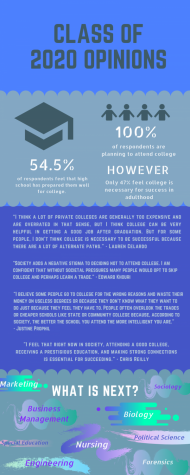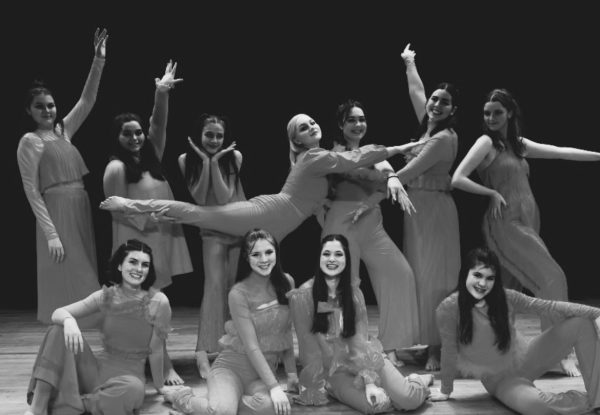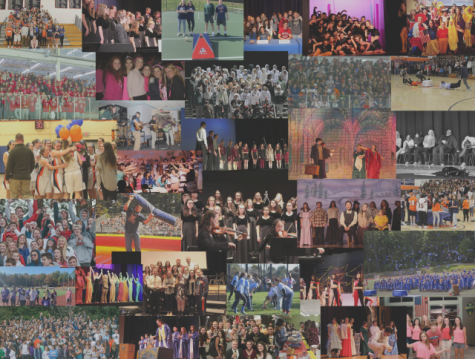College Admissions Through the Eyes of the Class of 2020
Seniors Reveal Their Opinions on the Admissions Game as They Await Their Decision Letters
The official Common App website—home to the most popular medium for college applications—reveals that over one million students complete this application each year. College applications are dispersed amongst over 5,300 colleges and universities both nationally and internationally. Walpole High School seniors only represent a mere proportion of college applicants annually. In a survey sent to all WHS seniors, approximately 25 percent of the class responded. Of that 25 percent, 100 percent confirmed that they plan to attend college.

Seniors responded to a survey in which they shared information regarding their post-graduate plans, intended majors and general opinions.
Why do students want to attend college?
The Common App website also—presumably for self-promotion—features mantras encouraging prospective applicants to make the commitment to college. Yes, commitment is the proper word choice, as attending college is a major financial obligation with, according to Naviance, families with incomes over $110,000 paying an average net price of $26,998 for tuition at the University of Massachusetts-Amherst (UMASS Amherst). Notably, UMASS Amherst is commonly perceived as an economically viable option for WHS students. However, the vast majority of WHS students take on this financial burden and delve into the life change that is higher education.
“In 2020, a college degree is essential in corporate America,” senior Andrea Wilber said. “Although there are ways to be successful without a college degree, college will give me the experience I need to get a job.”
Enrolling at a university as a first generation student—meaning that neither of one’s parents obtained a bachelor’s degree—has also become a popular, and perhaps trendy, reason for students to attend college. Such an accomplishment paves new paths for students and their families, and colleges have coined this accomplishment as an admissions hook that may improve a student’s chances of admission.
“I would be the first in my family to finish high school and go to college,” an anonymous survey respondent said.
Is a college education overrated?
Although all WHS survey respondents are attending college, some conceded that this path is overrated. Disclaimer: there are means of success that do not require a college degree.
“I feel as though college is ingrained in our brains from a young age as necessary for success, but the reality is that college is not for everyone,” an anonymous survey respondent said. “If society stopped portraying the message that ‘you need to go to college in order to get a job and be successful in life,’ I feel as though kids would be more open to entering a trade or taking a gap year, rather than jumping into college if they aren’t ready or if it’s not something they want.”
47 percent of WHS survey respondents shared that they do not feel that college is necessary for success in adulthood.
“I feel like society at large does not respect blue collar jobs enough. Many people who go into a trade like carpentry, plumbing or electrical work enjoy their lives and make decent money, but traditional school often only emphasizes the importance of STEM (science, technology, engineering, math) subjects,” senior Margaret Wall said. “I also think circumstances like gap years should be more normalized in America, because many highly intelligent individuals find much more meaning and success in life through travelling or investing in start-ups.”
Nonetheless, students acquiesce to such a societal standard. Neglecting to attend college is not quite taboo, but is stigmatized. This should not be so, especially considering that admissions decisions are generally objective, meaning that admissions officers do not know applicants on a level deeper than what is presented to them on paper. Business Insider detailed that Brown University’s admissions officers are expected to allocate 12 minutes per application. A student’s high school career culminates into a short 12 minutes.
“It is just luck of the draw and what the admission person reading your application thinks at that moment in time,” an anonymous survey respondent said.
Are college admissions fair?
The recent “Varsity Blues” scandal—in which 50 people, including celebrities Lori Loughlin and Felicity Huffman, were charged for a bribery scheme to place students in top universities—has brought to light the corruption that prevails in college admissions. According to a recent study conducted by USA Today/Suffolk University Poll, fewer than one in five Americans believe that the college admissions process is “generally fair.”
“I don’t think [the Varsity Blues scandal] personally impacts me that much, because I’m only applying to one school that people would probably bribe to get into, but super rich kids make up a nominal percentage of applicants, so them paying their way in is not the main reason why people are getting into schools. If I were rejected in favor of an ‘Olivia Jade’ type I’d be mad, but I don’t think it’s even close to the main issues surrounding college that we should be focusing on,” senior Caitlin McCabe said.
The class of 2024 is the first class to enroll in college since influencer Olivia Jade, Lori Loughlin’s daughter, was exposed for, well, cheating her way into the University of Southern California. Unfortunately, WHS students were not shocked by these allegations. In a world where people are ranked against each other based on statistics, such as standardized test scores, students are bound to crack under the pressure. Luckily, many schools are opting to become test optional, so they do not consider ACT or SAT scores from potential students. Perhaps this transition will alleviate some of the pressure college applicants face, but, seemingly, few universities deter Olivia Jade-esque applicants from donating their way into their dream schools.
What is the future for college admissions?
This year, the Boysenberry Crew—directed by juniors Danielle Dentremont and Catherine McLellan—will premiere a documentary, titled “The Admissions Game,” in the annual Film Festival. This film is a collaboration with The Rebellion and it will feature several WHS seniors throughout college admissions journeys.
Perhaps, the most unsettling component of college is the tuition. 71.2 percent of WHS survey respondents agree that financial aid options and scholarships will weigh on their final decisions, and rightfully so. College tuition prices only seem to grow and the point at which a college degree becomes unaffordable for the majority may be approaching.
“Overrated? Maybe. Overpriced? One hundred percent,” senior Lang Delapa said.

Danielle Dentremont, class of 2021, is an Editor-in-Chief for The Searchlight. At Walpole High School, she is captain of the cross country team and runs...

Catherine McLellan, class of 2021, is the Lifestyle Editor and the Assistant Managing Editor for The Searchlight. At WHS, she is a captain of the cross...

Charlotte Clarke, class of 2021, is the Graphics Editor for The Rebellion. At Walpole High School, she runs cross country and track and is involved in...












